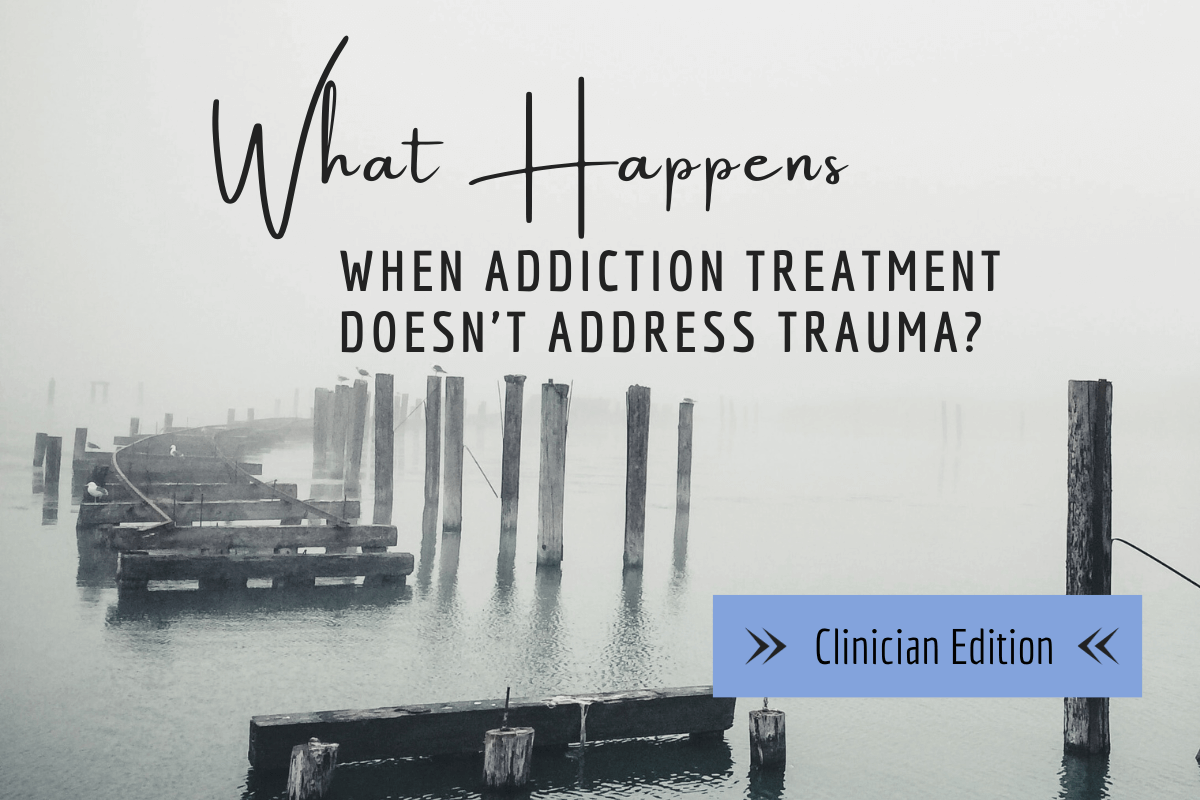Trauma or Addiction: Which Should Clinicians Focus On?
TRAUMA OR ADDICTION?
"Always deal with the alligator closest to the boat" – it's an excellent reminder about dealing with most urgent problems first. That's why we turn off a running faucet before cleaning up the water that's overflowed. Or why first-responders make sure people are safe before figuring out the cause of an accident.
It's also a phrase I've heard from people who work in addiction treatment. Often, clients in an addiction treatment program have several areas of concern: addiction and mental health concerns, including trauma. Unfortunately, some clinicians approach clients with concurrent disorders believing they need to address the most urgent problem first. Often, addiction is that "alligator closest to the boat".
While treating addiction can be an urgent issue for some, it isn't always helpful to see it as the only problem to focus on in the early stages of recovery.
There is an abundance of research revealing an essential connection between traumatic experiences and the development of addiction disorders.
In North America, about 7% of the population will experience PTSD in their lifetime, but 36-50% of people receiving treatment for substance use disorders fit the criteria for PTSD.
People with PTSD are four times more likely to develop problems with substance use than those without that trauma diagnosis.
Even those without PTSD may still be experiencing the impacts of trauma that increase the risk of substance misuse or other behavioural addiction.
If you're interested in knowing more about the connection between trauma and addiction, read Trauma & Addiction: The Link We Can't Ignore, written for specifically for clinicians. This informative article discusses the statistics and research showing a clear pathway demonstrating trauma increases the risk of trauma developing addiction disorders. It also covers some of the reasons we need to pay attention to this clear connection:
Trauma and addiction lead to more significant adverse outcomes: increased problematic substance use, earlier age of first use, more mental health issues, and increased self-harming behaviours.
Those dealing with co-occurring trauma and substance misuse often receive less benefit from addiction treatment programs. Trauma symptoms can interfere with fully benefitting from treatment for substance use disorders.
Trauma and substance use negatively impact each other – one problem often feeds the other. When self-regulation and healthy coping get disrupted by trauma, it creates a desire to self-medicate.
Understanding the link between trauma and the development of substance use disorders or other addiction disorders raises some vital questions. For example, what are the best ways to move forward with treatment? Which of these issues should get treated first? Which one is the focus when a person begins treatment?
Historically, there was minimal overlap between programs that treat trauma or addiction disorders. Even now, it would not be uncommon to find trauma treatment programs that do not provide services to those in active addiction.
It is not uncommon to have addiction treatment programs providing little or no treatment for underlying trauma or other mental health issues such as anxiety or depression.
Although there's a growing awareness of trauma as a significant contributing factor for those experiencing substance use disorders and addiction, there is often far too little practical help for someone desperately trying to stop their spiralling addiction. Many factors contribute to this:
1. There is often too little support for historical trauma in the addiction treatment system.
I was initially trained as a trauma therapist when I started my career as a therapist. However, when I began working in a residential treatment program almost 15 years ago, the director gently reminded me that my focus was on addiction because the centre didn't treat trauma. Recently, we had a chuckle at this after his perspective shifted.
At the very least, addiction treatment centres need to become "trauma-informed". This term refers to implementing principles of care that include: creating safety, being trustworthy, offering choice and collaboration, empowerment, and respect for diversity. Trauma-informed care recognizes these principles are foundational when supporting people in recovery from addiction.
Secondly, people seeking addiction treatment would benefit from more programs that provide education and tools to create the safety needed to heal from trauma.
2. Many of the staff working in addiction treatment programs lack clinical training in trauma, including recognizing and safely treating trauma symptoms.
It's a sad reality that a significant number of common impacts of trauma are viewed as "resistance" to treatment or that someone "hasn't hit their bottom yet". Also, intense cravings can be mistaken for a desire to remain in addiction rather than seeing that someone is triggered by trauma-related anxiety, flashbacks, or anger. If a client has been medicating their trauma, it makes sense that they would experience painful triggers once they stop self-medicating.
3. Mental health clinicians often are inadequately prepared to deal with active addiction.
Historically, addiction treatment programs have been run by those in recovery themselves. At the same time, mental health issues (including trauma) are the domain of those trained in clinical counselling programs – and there has been too little focus on developing training and programs that approach working with both trauma and addiction in an integrated manner. Fortunately, this has begun to shift with the vast amount of research on the trauma and addiction connection.
4. There are standard practices in many treatment programs (both addiction treatment and trauma treatment) that create an environment of shame and fear.
Counselling tools that utilize confrontation or shaming adds to the challenge and stigma of addressing trauma and co-occurring addiction disorders.
5. Treatment providers often believe people cannot begin addressing their trauma in helpful ways while still using substances.
There is also the belief that someone should not attempt to address their trauma history until they have had a period of abstinence or sobriety: "always deal with the alligator closest to the boat". But asking someone to give up an effective means of coping with trauma symptoms without providing awareness and tools to address the trauma is a set-up for failure.
Many are unable to do this simply because they lack the support and tools to cope with their trauma symptoms effectively in any other way – not that they don't want to be sober "badly enough" or they haven't "hit their bottom yet."
6. Treatment that lacks the awareness and support needed to safely address both trauma and addiction disorders can create frustration and hopelessness in the treatment process.
Those with co-occurring trauma and addiction are more likely to drop out of treatment or relapse shortly after completing a treatment program if both issues are not addressed simultaneously as part of the treatment plan.
So which issue should we focus on when someone is experiencing the symptoms of both trauma and addiction disorders? The simple answer is this: both.
Read more about the negative outcomes for clients when trauma is not addressed as part of addiction treatment.


